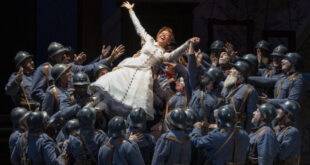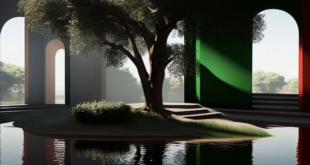The serious opera lover would have to go back over half a century, when Maria Callas made her American debut, to find a more prestigious Chicago event than the Monteverdi 450, scheduled for October 12, 13 and 15 at the Harris Theater in Millennium Park.
On each of these three dates, one of Claudio Monteverdi’s extant operas will be performed – “L’Orfeo” (1607), “Il ritorno d’Ulisse in patria” (1639) and “L’incoronazione di Poppea” (1642). The performing company is doing an international tour of selected cities, and Chicago is the American première. The only other place in the United States where Monteverdi 450 will appear is in New York at the Lincoln Center.
The performing of the three operas is named “Monteverdi 450” because 1567 was the year of the composer’s birth – 450 years ago. They are also being presented because Monteverdi was an outstanding composer, and his feel for the theater helped him to create the earliest operas that are still staged. Born in the beautiful town of Cremona, he knew instrumental and vocal music intimately, being a viola player and singer. In his 30s he was part of, then led the musical forces of the Gonzagas at Mantua, then was recognized as the great master he was by being made “maestro di capella” at San Marco in Venice from 1613 until his death in 1643.
 Monteverdi’s music is often described as being a kind of bridge between Renaissance and Baroque styles. This is not a bad description. In his music the unbraided polyphony of the Renaissance is clearly apparent, but so is the dominance of a single voice, or melody, over the others, that became popular in the Baroque and later artistic eras. Monteverdi also moved away from the established method of handling the contrast between consonance and dissonance, called the “prima practica” (first style). Far more adventurous in this regard, Monteverdi coined the term “seconda practica” (second style) to describe how he approached the technique.
Monteverdi’s music is often described as being a kind of bridge between Renaissance and Baroque styles. This is not a bad description. In his music the unbraided polyphony of the Renaissance is clearly apparent, but so is the dominance of a single voice, or melody, over the others, that became popular in the Baroque and later artistic eras. Monteverdi also moved away from the established method of handling the contrast between consonance and dissonance, called the “prima practica” (first style). Far more adventurous in this regard, Monteverdi coined the term “seconda practica” (second style) to describe how he approached the technique.
His composition practice served him well when he created operas. In a similar way to composers like Mozart and Verdi who came after him, Monteverdi could achieve nuances of emotion that made the characters more credible. Of course, he composed more than operas — madrigals, motets, masses and sacred music of all types, incidental music, even a ballet or two. In other words, he was one of the most prolific composers in history.
The moving force behind Monteverdi 450 is its artistic director, conductor Sir John Eliot Gardiner. Rightly associated with early music like Monteverdi’s, Gardiner actually has a vast repertoire, and has conducted operas like Mozart’s “Die Zauberflöte,” Bizet’s “Carmen,” Verdi’s “Falstaff,” and all of Beethoven’s symphonies. Many lovers of Italian opera, like this author, will be pleased to note that Gardiner refuses to conduct Wagner! So this was one composer whose music was (thankfully) not played by the “Orchestre Révolutionnaire et Romantique,” which was founded by Gardiner in 1989 and devoted to performing mostly 19th century music.
But it is the Baroque and pre-Baroque music that Sir John Eliot Gardiner is truly famous for. The title of a book on Bach he wrote is most telling – “Music in the Castle of Heaven” (2013). In 2014 he was appointed the first president of the Bach-Archiv in Leipzig. This was a particularly well-deserved honor in light of his Bach Cantata Pilgrimage, in which he directed all of Bach’s sacred cantatas in churches in many cities in Europe and America.
There is simply no one better qualified to bring the operas of Monteverdi to the stage than Sir John Eliot Gardiner. He is both founder and director of the Monteverdi Choir and the English Baroque Soloists. These are the vocal forces that are performing the Monteverdi 450 under Gardiner’s direction. So the performers are experts at what they do, not merely hired hands that go from job to job. Thus we may expect some truly inspired singing, especially as it is directed by such distinguished leadership.
The operas will be sung in Italian, which is the very best way to hear them, but don’t worry! Supertitles with English translations will be provided.
It cannot be certain how many operas Claudio Monteverdi composed. There are fragments of many, and indications that he wrote the music for quite a few. He certainly must have produced a number of operas between 1607 and 1639. But we have only three complete works. There are some intriguing similarities between Monteverdi’s work and that of the later masters, with whose music dramas we are very familiar. (In my review of “L’Orfeo,” I’ll point out a stunning similarity between Monteverdi and Verdi regarding the relationship with the librettist.)
There is, however, one major difference between the very first operas, like Monteverdi’s, and the later Baroque and Romantic operas. When opera was created around ten years before “L’Orfeo,” as a conscious attempt by the Florentines to resurrect Greek Tragedy, the “opera in musica” (work in music) was meant to be a text of a play that was set to music. In doing this, the words of the text were to be given strict supremacy over the music. Ironically, the instrumentalists were given free rein to improvise – but not the singers, whose embellishments were tightly restricted.
This was all reversed with the advent of the “da capo aria,” a song form that provided the singers with the opportunity to improvise to their hearts’ content. Neither the subject of the opera nor the composer’s intent mattered one whit – the virtuosity of the improvisations was everything. And audiences were delighted with this development, even if most of the improvisers were castrated men singing. When Mozart came along, however, all this ended. He composed everything, including the embellishments, or what might sound like improvisations.
Part of the reason why vocal improvisation in Italian opera went over so big was that, like the Greek Tragedies, the subjects were about gods and goddesses, heroes and heroines and myths and legends that had no meaning to the 17th and 18th century audiences. Monteverdi’s operas, like Mozart’s, were “through-composed,” and his work was very well received for a couple of reasons. First of all, Monteverdi was simply an outstanding composer, whose music is very beautiful, and easy to listen to. Then there was the novelty of Italian opera – a play being sung all the way through instead of spoken. People were amazed by experiencing this, although music and drama had been intermingled more and more, even before the first opera in 1597.
So the production of Monteverdi 450 will be a very auspicious moment in the musical life of Chicago. Call the Harris Theater box office for tickets now! 312-334-7777
Visit www.harristheaterchicago.org for more info.
 Fra Noi Embrace Your Inner Italian
Fra Noi Embrace Your Inner Italian







